Sally Murphy's Blog, page 47
April 28, 2016
Poetry Friday: Cherry Tomato
I’ve been busy writing about poetry for my doctoral studies, which means (a little ironically) I have missed the last two Poetry Fridays. So I was determined to post something today but couldn’t settle on a topic. So, I decided to scroll through my photos and choose one to write an impromptu poem.
The first photo that caught my eye was this one:
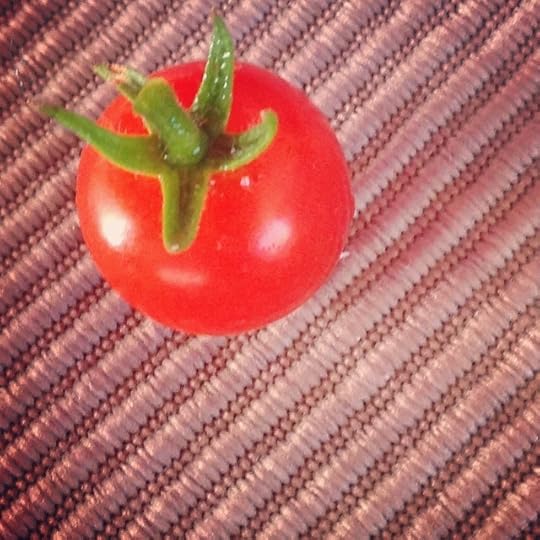
I took it early last year. It’s the first, perfect, cherry tomato from last year’s crop. I was so proud of that one tomato that I photographed it and shared here on my blog, and on Facebook and Twitter too. But afterwards I ate it which is, after all, what one should do with a tomato. I remember very clearly that it was delicious – and left me wanting more, which of course I had to wait for, because the others weren’t ripe yet.
How to capture that in a poem? Here’s my effort.
Cherry Tomato
You looked
too perfect to eat
So instead I took a photo
shared you with the world.
through social media
collected likes
and comments.
Later though
I succumbed
to your wiles
and ate you in a single
sweet, tangy mouthful.
I don’t remember who commented
or how many likes you garnered
but I do remember
that delicious bite
that I couldn’t share
with anyone.
(Poem copyright Sally Murphy 2016).
Haven’t written a poem lately? Here’s a challenge: scroll through the photos in your social media account, or on your phone – then see if you can capture that moment in a few lines of poetry.
Have a great Poetry Friday. The roundup today is at Buffy’s Blog.
April 7, 2016
Poetry Friday: Joi, the Glug
I love finding old anthologies and collections of poetry, and discovering what they offer as well as seeing what children of the past were offered.
I came across an anthology called This Land on ebay and just had to have it. When it came I was amazed to discover that it was the same age as me (wasn’t I cute?) and my beautiful gold teddy.

The anthology is filled with poems by poets whose works I grew up with – CJ Dennis, Colin Thiele, Banjo Paterson, Dorothea Mackellar and more, as well as others I was less familiar with. There’s lots to like her, though in some ways the collection shows its age, with some colonial overtones that (thankfully) have not stood the test of time, and a massive imbalance in representation of female poets.
Anway, back to the poems. I thought I’d share one to give you a taste, and chose one randomly by the letting the page fall open.
Joi the Glug
By CJ Dennis (1876-1938)
The Glugs abide in a far, far land
That is partly pebbles and stones and sand,
But mainly earth of a chocolate hue,
When it isn’t purple or slightly blue.
And the glugs live the with their aunts and wives.
In draught-proof tenements all their lives.
And they climb the trees when the weather is wet,
To see how high they can really get.
Pray, don’t forget,
This chiefly done when the weather is wet.
(Read the rest of the poem here – it’s longish, but worth it).
What I love about this poem is that it seems nonsense and lots of fun, but as you read further it emerges that it is also a comment about unquestioning conformity. CJ Dennis was one my favourite poets as a child – and I think I’ll share some more of his work in future posts, but in the meantime, if you haven’t read his work, look him up!
This week, Poetry Friday is hosted by Laura Salas. Do drop by and see what other poetry goodies have been posted around the blogosphere.
Have a great Friday!
April 6, 2016
Festival Fun
As you may know from previous posts, I love getting out and about and talking about books and writing and reading and poetry to audiences of all ages.
So, I really enjoyed my two most recent festival visits – even though I’ve been so busy festivalling and catching up in between that I haven’t blogged about either of them. So, here goes.
Festival 1 was just down the road from where I live. Seven Rooms Seven Stories was a debut festival hosted at Mary MacKillop Catholic College in Busselton, and organised by the amazing Beth from Dymocks Busselton.
Beth and her team did an awesome job of organising the festival: everything ran so smoothly, it was hard to believe it was the first year this event was held. And I’m sure it won’t be the last. All the authors and illustrators invited were West Australian, which was a nice touch, and the audiences were keen, well prepared and very engaged.
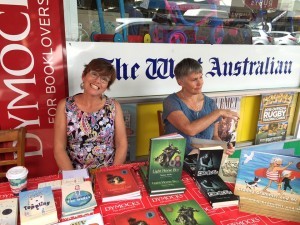
Signing books with the wonderful Dianne Wolfer.
Festival 2 was a little further away, in Albany, in the Great Southern Region – about 4 and a half hours drive away. I really enjoyed the drive down and back – it’s a beautiful road trip. The festival, the Southern Sea of Words, was hosted by Great Southern Grammar and organised by the lovely librarian, Karen.
The festival, over two days was lots of fun. Day 1 was spent with groups in the school and day 2 was open to the public, and I spoke to adults and children. I even did my debut session as a performance poet, which I loved and will blog on in an upcoming post.
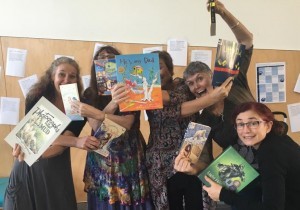
I promise I’m in this one! Having fun with Leanne White, Sandy Fussell, Dianne Wolfer and Deb Abela, some of the other presenters.
Now I’m back home and back at my desk . It’s always good to get back to work, but I do love getting out and about!
April 4, 2016
Teaching Tips: Using Do Not Forget Australia In the Classroom
I had an email from a teacher named Hillary who asked the following: Just purchased ‘Do Not Forget Australia‘ to read to my yr 2/3 class . I was hoping to pick your brains about the best way to help the children relate to the story. Their world view is not broad so I am searching for ways to help them identify with the story. Any ideas?
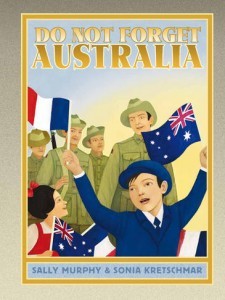 I sat down to reply to the email then decided that there was so much I could say, and with ANZAC Day approaching, I might instead answer it here on the blog. Do Not Forget Australia is historical fiction set in 1918 and explaining the events at Villers-Bretonneux on April 25, 1918 and the subsequent rebuilding of the local school with funds raised by Australian children. The book is suitable for reads from primary school age through to adult but, as Hillary points out, some children will need extra help to understand the story.
I sat down to reply to the email then decided that there was so much I could say, and with ANZAC Day approaching, I might instead answer it here on the blog. Do Not Forget Australia is historical fiction set in 1918 and explaining the events at Villers-Bretonneux on April 25, 1918 and the subsequent rebuilding of the local school with funds raised by Australian children. The book is suitable for reads from primary school age through to adult but, as Hillary points out, some children will need extra help to understand the story.
So, here are some ideas, all of which I’ve used.
Before reading, explain to children that you are going to read a story about friendship, and get them to discuss what friends do for each other. Ask them if they any friends who they’ve never met. Most will say no, but with prompting, some might remember that their family sponsors a child through World Vision or similar, or they (or, more likely, a parent) might have a pen pal.
Briefly explain the concept of war and the reasons we commemorate it (this can be done either before reading, or during closer study). My feeling is that it’s important that we don’t glorify war and avoid using terms like ‘winning’, ‘victory’ and ‘enemies’ – because the complexities of war are so very great.
Use a world map to show where France is, and especially Villers-Bretonneux, and also where Australia is, especially Melbourne.
Talk about what travel and communication were like in 1918: no aeroplane travel, meaning to travel to France was a lengthy sea journey, and it was unlikely two children like Billy and Henri would have met in real life. Also highlight things like: no internet, no telephone, no television. Mail was slow (again by ships) so families at home relied on letters that could be quite out of date, as well as newspaper reports.
After reading, talk again about friendship. Try to highlight the friendship between Billy and Henri, who never meet, but are linked by Billy’s father, the soldier who Henri helps. Also highlight the friendship between the two countries: Australian soldiers fighting to try to save the village, and later the Australian children sending money for the school; and French villagers helping the soldiers with food and warmth, then putting up the signs in the school to honour the gift, as well as continuing to look after the graves of the Australians who died.
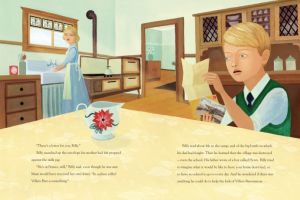
I hope these ideas help Hillary and any other teacher or librarian who wants to share Do Not Forget Australia in the lead up to ANZAC Day. There are also teacher’s notes for the book available here.
If you have any questions for me about teaching my books, or about writing and publishing, or about things that happen in my books, why not drop me a line?
March 20, 2016
World Poetry Day: A Double Celebration
It’s World Poetry Day, a day to celebrate and share the magic of poetry.
To celebrate the day, my friend and wonderful poet Jackie Hosking, suggested a blog link up, with Australian children’s poets who have been published in The School Magazine posting about our experiences.
If you don’t know, The School Magazine is celebrating is centenary this year. For one hundred years the magazine has been entertaining and educating Aussie kids with poetry, stories and more. That’s a massive achievement.
On a personal level, I feel like School Magazine was where it began for me as a children’s poet, because it was where my first published children’s poem appeared, back in 2002. So, to celebrate World Poetry Day AND the anniversary, here is that poem:
Summer Salad
Cool
Crisp
Crunchy
Carrot
Luscious
Leafy
Lacy
Lettuce
Delicious
Delectable
Delightful
Dressing
Summer Salad
(Copyright Sally Murphy 2002, 2016)
Since 2002 I’ve had lots of poems published – in the School Magazine, in other journals, in books, and online, but I always feel an extra thrill of delight when one of my poems finds its way into the pages of the School Magazine.

Happy World Poetry Day to you – and congratulations, School Magazine.
You can see what other Aussie Children’s Poets have to say about World Poetry Day and School Magazine here.
March 16, 2016
Throwback Thursday: On the Pyramid
This week for Throwback Thursday I thought I’d share a very old photo. In fact, this photo is over 100 years old.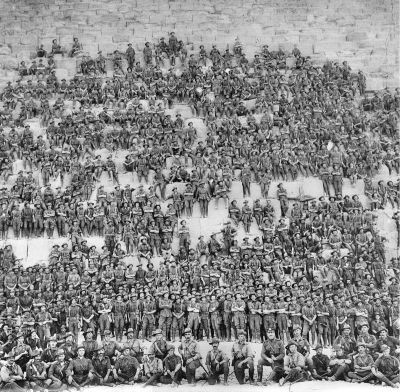
It’s a photo that, like many other Australians, I’ve seen many many times., I knew that this was a photo of Australian troops taken in Egypt during WW1, but when I began my research for my book 1915, this photo became for a me a starting point.
The photo was taken in January 1915, and features the men of the 11th Battalion of the AIF who were in Egypt preparing to join the war. They didn’t know it then, but in April those men would land at Gallipoli. Many of them would never leave.
As I researched WW1, looking for a place to start my story, I realised that if my character was from Western Australia (which he was) then he would have been in the 11th and, therefore, in this photo. So, at the start of 1915 I have my character, Stanley, climbing the pyramid with his mates, ready to have their photo taken.
Writing that scene was both a joy and a torment. A Joy because I knew that young men like Stanley were excited to be off on an adventure, seeing the sights of Egypt, climbing pyramids, being outside of Australia for the first times in their lives, excited about having their photo taken. But a torment, because while Stanley was fictional, the harsh realities of what later befell those very real young men in the photograph was something they could never have predicted, but which I, with 100 years of separation, knew and could hardly bear.
I have a copy of this photo which I take with me when I go to speak about 1915. Like me, people young and old are fascinated by the quality of photography from a century ago, and fascinated by the many details they can see – the looks on faces, the poses of the men, the things they are holding and wearing. And, like me, when they realise the future these men faced, their emotions are mixed.
This photo, and stories like 1915, remind us of the past in the hopes we can make a better future.
March 15, 2016
Contributor Copies: Heartfelt Moments in the AFL
I write for children. It’s what I do and it’s what I love to do. So imagine my surprise when I was asked to write a chapter for a book for adults. Then imagine my amazement when told that the subject was Australian Rules Football. Sure, I love my team (the Dockers) but can’t even name every player. Sure I love to watch footy – especially if the Dockers are playing – but my knowledge of the game is general at best.
But I was asked, and I have a rule that when I’m asked to write or speak (the two things I do to make my living) I say yes whenever possible. So before I could stop and think too hard I say yes to contributing a chapter about heartfelt moments in AFL from the perspective of a Fremantle Dockers supporter.
It took a while to figure out what to say, but then I realised that I’m always talking about the Dockers – even at school visits, and that it was my passion the editors were after, not my knowledge. So I sat down and wrote my chapter (and rewrote it) and sent it off, wondering if it would make the final cut.
Then, today, a parcel arrived in the mail, with contributor copies of Heartfelt Moments in Australian Rules Football. I’ve seen my name on books before, but seeing it on the front of a footy book made me smile. And looking at the list of fellow contributors – many of whom know much, much more about footy than I do – made me smile even more.
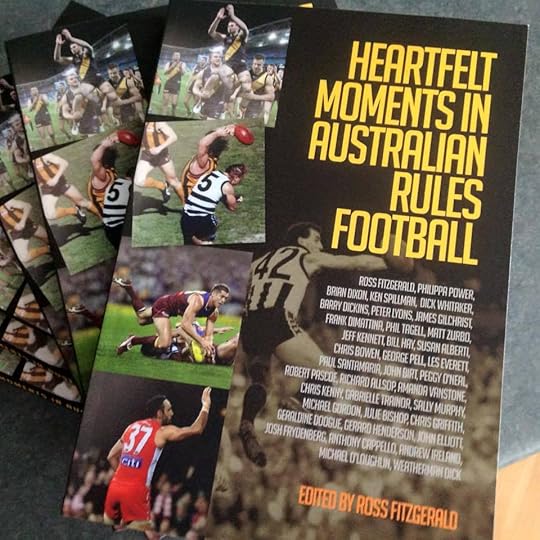
So what’s my chapter about? In a nutshell, it’s about how being a Dockers supporter is about living in hope. Which isn’t too bad a way to live at all.
March 10, 2016
Poetry Friday: Dolphin and Me
Yesterday, I went for a quick walk on my local beach. Only, it didn’t end up being a quick walk at all, because I spent more than an hour watching a pod of dolphins play, and fish and splash just off shore.
I tried to get some footage on my phone, and while it’s not great, you can see a snippet of what I saw – and hear my exclamations.
Afterwards, I tried to capture the feeling I had, on an otherwise empty beach, that the dolphins knew I was there and were entertaining me.
Dolphin and Me
A tail
A fin
A splash
A jump
A wave?
A smile
A gasp
A camera click
A sigh
A wave.
(Poem copyright Sally Murphy, 2016)
Today’s Poetry Friday roundup is hosted by Irene at Live Your Poem. Head over there to see what other poetry goodness is on offer around the blogosphere.
March 9, 2016
Throw Back Thursday: A Booklaunch
Last week when I visited Penrhos College I was surprised – and delighted – how popular my picture book Pemberthy Bear was with the students. It’s been ten years since it was released, so it’s wonderful that it is still being read and loved.
For Throwback Thursday I thought I’d dig out a photo from the launch of Pemberthy Bear, at the CBCA National Conference in Sydney in 2006.
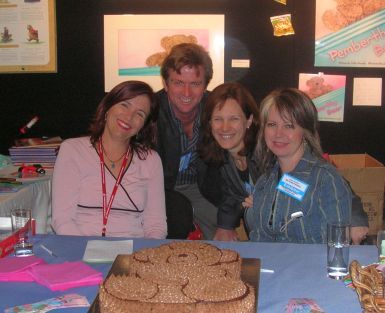
I’d forgotten how long my hair was back then! That’s me on your left, Peter and Sophia Whitfield, the owners of New Frontier Publishing in the centre, and the fabulous illustrator Jacqui Grantford on the right. And, of course, a fabulous Pemberthy cake in the front. Yum.
Have a great Thursday.
March 4, 2016
Poetry Friday: The Library at Lunchtime
This week I spent two wonderful days in the library at Penhros College in Perth, talking with lots and lots of wonderful young people about books and writing.
I haven’t yet received any photos that I can use from my presentations, but I did manage to snap this one of the display the library staff had put together:
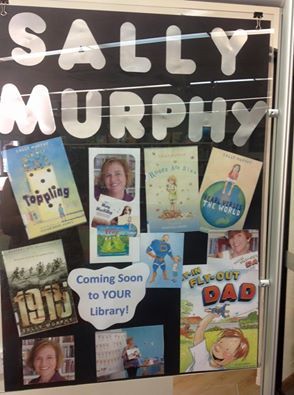
One lunchtime, I sat in the library during the lunch hour, chatting with girls who came to speak to me, and working in between. It occured to me that the library was very different from libraries of the past, and found myself drafting a poem about what I saw – and what I didn’t see.
The Library at Lunchtime
No hushes
Or shushes
Or whispered warnings
No glares
Or stares
Or muttered reprimands
Only games
And smiles
And laughter
And kids sharing books
Sprawled on bright mats
Or, on their own,
Lost in blissful
Turning of pages.
(Poem copyright Sally Murphy, 2016)
Today’s Poetry Friday roundup is hosted by Teacher Dance.



